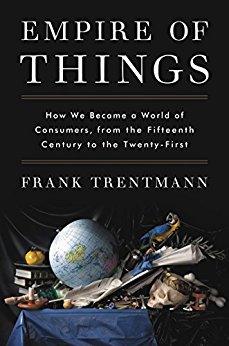 What We’re Reading:
What We’re Reading:
Empire of Things: How We Became a World of Consumers, from the Fifteenth Century to the Twenty-First, by Frank Trentmann.
Trentmann is professor of history at Birkbeck College, University of London, and a prolific book writer. As an academic work, this book is an easy read, but it’s a description of the growth of human consumption over the past 500 years, loaded with detail. Reviews from readers uninterested in detail pronounced it boring, but the patient reader will find many well considered insights. Best, Trentmann is versed in the sciences of material goods, ecology, and human social behavior.
At the end of a long treatise, Trentmann sums up his major insights. Society now ticks to a much faster rhythm than in the past. Our rate of material consumption accompanies that faster pace. But somehow, some way, we must engender “a more general appreciation of the pleasures from a deeper and longer-lasting connection to fewer things.”
Then he wraps it up in the last paragraph: “Such a debate has to be bold and envisage different lifestyles and concomitant changes to housing, transport, and culture. It will need more people to remember that, as consumers, they are citizens, and not just customers. And it will need historical imagination.”
In other words, no silver bullet will let us keep consuming at our present rate, much less keep increasing it. Any effective change must encompass everything, from the value of sharing housing (instead of living solo) to questioning the need for more frequent showers and changes of clothes. A small shift in habits is far from enough.
Among the insights, zero waste is defined more strictly than the popular zero-to-landfill; it’s zero depletion or degradation of natural resources. Trentmann’s data show that in households, electronic miniaturization and compact appliance designs use less material and energy per unit, but this is offset when the increase in number of units sold eats a bigger total footprint than before. This market bounce applies to everything from cars to televisions. We have to reduce our total consumptive footprint, not only using gizmos, but considering the footprint to acquire them, repair them, and dispose of them.
Also, consumption across the world and even in the same communities is very unequal. Trentmann describes this as mountaineers scaling peaks in the Himalayas, forging ahead with greater ease while the Sherpas toting heavier and heavier loads behind enable them to do it. Elsewhere, efforts to do better by the environment are hampered by low-status plebes complaining that fairness issues have to be addressed first.
Finally, Trentmann ventures that “sovereign consumerism” must give way to social aspiration to be environmentally responsible – no easy transition.

 What We’re Reading:
What We’re Reading: